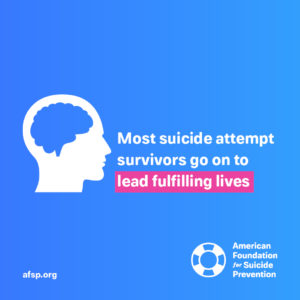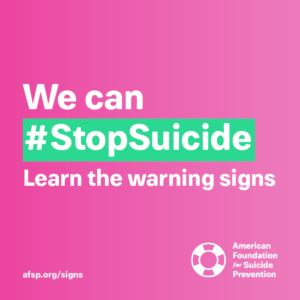“I did not realize the extent of suicide until it affected me so personally. Since I lost my Dad to suicide 3 years ago, I have learned a lot about suicide and mental health. Most mental illnesses can be effectively treated and most of those suffering from mental illness do not die by suicide. Unfortunately, my Dad’s story did not have a good ending. That is why I am passionate about this cause and want to shed light on suicide prevention, awareness, and support.”
Samantha Damsky, a resident of Telluride, has become a tireless advocate for suicide prevention in the years since she lost her father, and is working in our community to reduce the stigma associated with mental illness, and help those who might be considering suicide.
When we talk about suicide, we tend to focus on the lives lost to suicide and the resulting impact on family, friends, and community. We also continually hear about the high number of deaths by suicide in our region, state, and country.
Suicide is overwhelming, heartbreaking, scary, and intimidating. But, it’s also preventable. For every person who dies by suicide, there are almost many people who think seriously about suicide but do not die. Studies show that approximately 90% of individuals who survive a suicide attempt do not go on to die by suicide—suicidal feelings pass over time.
September is Suicide Prevention Month and it is an opportunity for you to learn more about the subject and what you can do to help prevent suicides in our community. Despite a rise in the number of young adults who die by suicide, there are important facts to remember when discussing suicide with family and community members:

- There are actions that people can take to help prevent suicide
- Prevention works
- Recovery is possible
- Effective programs and services exist
- Help is available.
Individuals and organizations in our community and across our region are working to change the discussions and are making meaningful contributions to the efforts around preventing suicide. While suicide remains a concern in Colorado where over 1,100 individuals died by suicide in 2016, research has shown that the availability of resources like the Colorado Crisis Line (1-844-493-TALK (8255)), and trainings such as Mental Health First Aid, do help to reduce the number of individuals who attempt suicide.
Mental Health First Aid training, considered to be “CPR for the mind,” provides community members with the tools to assist someone with a developing mental illness or in a crisis, and helps them to get the professional help they need. This class, offered frequently by Tri-County Health Network staff, gives you the tools to help. You can also help individuals who may be thinking about suicide by knowing the 5 steps promoted by the organization “bethe1to.com”:
- Ask
- Keep Them Safe
- Be There
- Help Them Connect
- Follow Up
These five steps can enable you to be the one to help someone who might be considering suicide.
In addition, it is important to know some of the warning signs associated with suicide. Suicide rarely occurs without some warning signs being present—knowing them can help you to be aware when a
family member, friend, or community member is considering suicide. They include:
- Talking about wanting to die or to kill themselves
- Talking about feeling hopeless or having no reason to live
- Increasing their use of alcohol or drugs
- Sleeping too little or too much
- Withdrawing or isolating themselves
- Talking about being a burden to others.

On September 30th, Telluride will be hosting the second Walk Out of the Darkness in Town Park, an effort to raise awareness in the community and raise funds to support the AFSP’s goal of reducing the number of suicides by 25% within the next decade. Ms. Damsky is organizing the 2-mile walk in Telluride after doing the same successfully on her college campus in North Carolina. Ms. Damsky says, “The AFSP is the leading national not for profit organization dedicated to understanding and preventing suicide through research, education, and advocacy. As a community and as individuals, we fight through our pain and continue our path of healing together. I know that by partnering with the American Foundation for Suicide Prevention, we are truly saving lives and helping others. As a newer member of our community, I am so excited to join forces and truly make a difference here in Southwest Colorado.”. If you are interested in participating in the walk, helping to organize the effort, or volunteer on the day of the walk, please contact Ms. Damsky at samidamsky@gmail.com, or by visiting the website www.afsp.org.
Tri-County Health Network will be hosting two screenings of the new documentary, “Suicide: The Ripple Effect”:
- Tuesday, September 18 from 5:30-8pm at the Michael D. Palm Theatre in Telluride
- Tuesday, September 25 from 6-8:30 at the Livery in Norwood
The screening will be followed by a facilitated session to discuss the film and efforts each of us can take to help reduce the incidence of suicide in our county. Food will be served at each screening.
During September, please take the time to educate yourself about suicide prevention efforts locally and those available through on-line resources. Help reduce the stigma associated with suicide by engaging with family, friends and neighbors about the subject.
And remember, Mental Health Matters in our community.
If you would like more information, please contact Tri-County Health Network at 970-708-7096 or via email at info@tchnetwork.org
–Paul Reich, Behavioral Health Programs Manager

